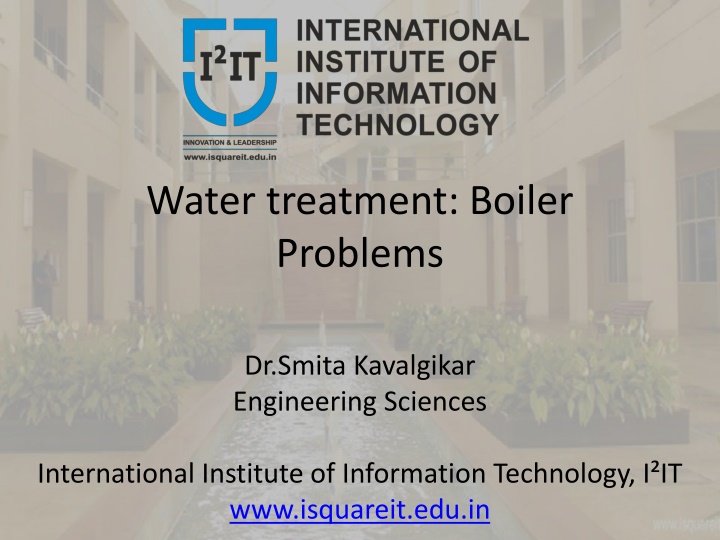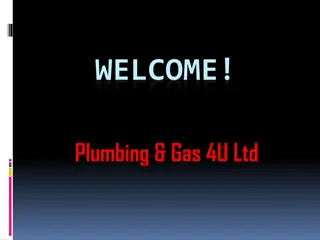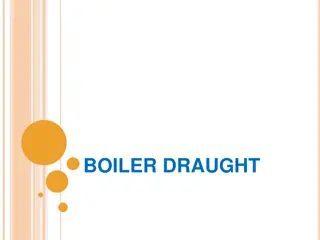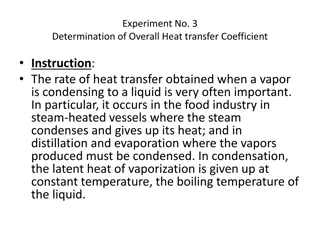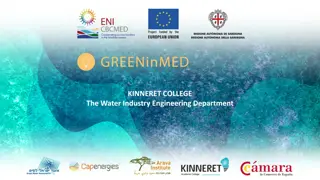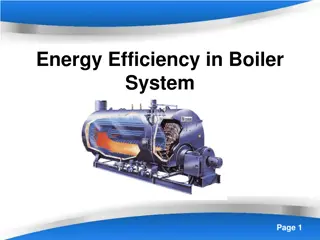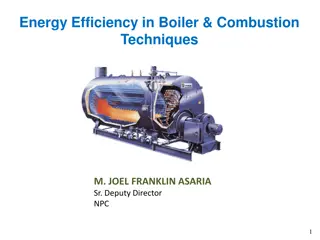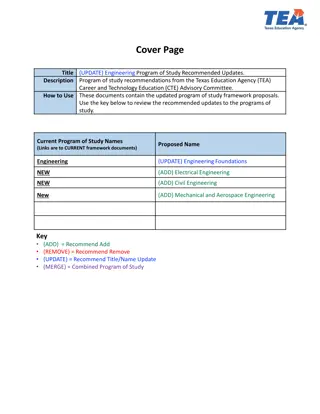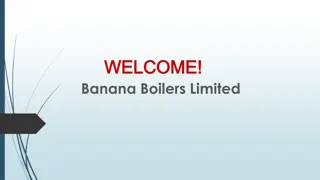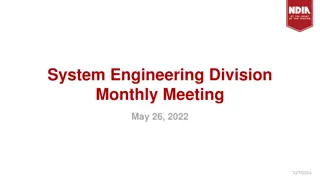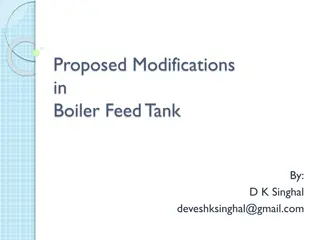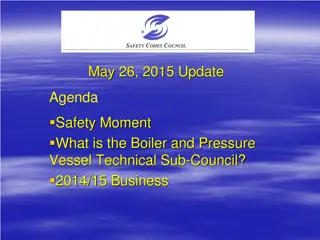Water Treatment and Boiler Problems in Engineering Sciences
Water treatment is crucial for boiler systems to prevent scale and sludge formation, ensuring efficient steam generation. Proper treatment of boiler feedwater, control of dissolved solids, and maintaining ideal water composition are key aspects discussed in detail. Scale and sludge formation are common issues in boilers, impacting heat transfer efficiency. Learn about the causes of sludge and how to address them effectively in engineering practices.
Download Presentation

Please find below an Image/Link to download the presentation.
The content on the website is provided AS IS for your information and personal use only. It may not be sold, licensed, or shared on other websites without obtaining consent from the author.If you encounter any issues during the download, it is possible that the publisher has removed the file from their server.
You are allowed to download the files provided on this website for personal or commercial use, subject to the condition that they are used lawfully. All files are the property of their respective owners.
The content on the website is provided AS IS for your information and personal use only. It may not be sold, licensed, or shared on other websites without obtaining consent from the author.
E N D
Presentation Transcript
Water treatment: Boiler Problems Dr.Smita Kavalgikar Engineering Sciences International Institute of Information Technology, I IT www.isquareit.edu.in
International Institute of Information Technology,I2IT,P-14,Rajiv Gandhi infotech Park,Hinjawadi Phase1,Pune-411057 Phone-+912022933441/2/3 | Email-info@isquareit.edu.in
BOILER Aboilerisadeviceforgeneratingsteam The furnace, which provides heat, usually by burning a fuel, and the boiler proper,adeviceinwhichtheheatchanges waterintosteam. The steam Applications :water heating, central heating, boiler-based power generation,cooking,and sanitation. Proper treatment of boiler feed water is an important part of operating and maintaining a boiler system. As steam is produced, dissolved solids become concentratedandform depositsinsidetheboiler. Thisleadsto poorheattransferand reducestheefficiencyofthe boiler. International Institute of Information Technology,I2IT,P-14,Rajiv Gandhi infotech Park,Hinjawadi Phase1,Pune-411057 Phone-+912022933441/2/3 | Email-info@isquareit.edu.in
BOILER FEEDWATER Feedwateriswaterthat undergoespurificationorpreheating and isthen supplied to boilers for hot water and steam production, or it can remain still. It is typicallyfound in thermal power plants where it is stored and conditioned in tanks, known as boiler feed water It should have the followingcomposition: 1. Its hardness should be below 0.2 ppm. 2. Its caustic alkalinity(due to OH-) 3. Its soda alkalinity(due to Na2CO3) should be 0.45-1ppm. Types of boiler Permitted hardness in feed water Low Pressure 40-80 ppm Medium Pressure 10-40 ppm High Pressure 0-3 ppm International Institute of Information Technology,I2IT,P-14,Rajiv Gandhi infotech Park,Hinjawadi Phase1,Pune-411057 Phone-+912022933441/2/3 | Email-info@isquareit.edu.in
Scale & sludge formation Water in boiler is continuously heated causes the increase in the concentration of dissolved and suspended solids. The precipitation in the form of soft loose and slimy deposits (sludge) The precipitation in the form of hard deposits, which are sticky on the walls of boilers (scale) sludge & Scale formation process International Institute of Information Technology,I2IT,P-14,Rajiv Gandhi infotech Park,Hinjawadi Phase1,Pune-411057 Phone-+912022933441/2/3 | Email-info@isquareit.edu.in
Sludge: The muddy solid at the bottom of the boiler (or) the loose, slimy and soft deposits in the boiler are called sludge. Occurs in colder areas ,collected in area where flow rate is slow or at bends of pipes Causes of the sludge:- The sludge is caused by MgCO3, MgCl2,CaCl2 which have more solubility in hot water Disadvantages of sludge Sludges are bad conductors of heat and results in wastage of heat and fuel Sludges entrapped in the scale get deposited as scale causes more loss of efficiency of boiler Excessive sludge formation leads to setting of sludge in slow circulation. Areas such as pipe connections leading to chocking (or) blockage of the pipes an disturb the working of boilers Prevention By using soft water which is free from dissolved salts like MgCO3, MgCl2, CaCl2 & MgSO4. Blow down operation can prevent sludge formation International Institute of Information Technology,I2IT,P-14,Rajiv Gandhi infotech Park,Hinjawadi Phase1,Pune-411057 Phone-+912022933441/2/3 | Email-info@isquareit.edu.in
Scale: - Scales are hard sticky deposits on the inner walls of boiler. The scales are very difficult to remove Main boiler trouble Causes of the sludge: Due to the decomposition of Ca(HCO3)2 at high temperature & pressure present in boiler, It forms caco3 insoluble salt settles as ppt in the boiler. Ca(HCO3)2 CaCO3 + CO2 +H2O CaSO4 highly soluble in cold water and less soluble in hot water. So the CaSO4 in boiler water is precipitates out as hard scale if the temp of boiler increases. The dissolved Mgcl2 present in water is precipitates as Mg (OH) 2 at high temperature, deposits as scale. MgCl2 +2H2O Mg (OH)2 + 2HCl Sio2 present in water deposits as calcium silicate or magnesium Silicate. The deposits are very hard. International Institute of Information Technology,I2IT,P-14,Rajiv Gandhi infotech Park,Hinjawadi Phase1,Pune-411057 Phone-+912022933441/2/3 | Email-info@isquareit.edu.in
Disadvantages of Scale: - Wastage of Fuel: As the scale is hardly sticky on the walls of the boiler and it is very bad conductor of heat or have low thermal conductivity. Heat transfer from wall of boiler to water is decreased. To get a steady supply of heat over heating is done. So there is loss of heat and fuel. Depends upon thickness of scale Lowering of boiler safety: Due to the scale formation we have to heat the boiler to high temperatures this causes the weakening of boiler material. Distortion of boiler tubes makes boiler unsafe to bear pressure of the steam (especially in high pressure boiler) Decease in efficiency: Due to scale deposits the chocking of boiler is observed. Danger of explosion: Due to uneven heat there may be developing of cracks in Scale. Due to uneven expansion crack in scale may increases. Whenever the water passes through this crack comes to contact with boiler plate and generates sudden steam and high pressure results explosion of boiler. International Institute of Information Technology,I2IT,P-14,Rajiv Gandhi infotech Park,Hinjawadi Phase1,Pune-411057 Phone-+912022933441/2/3 | Email-info@isquareit.edu.in
Removal of Scales: If the scale is soft. It can be removed by scrapping, by piece of wood or wire. If the scale is brittle. By giving thermal shocks done by heating to higher temperature and suddenly cooling. If scale is hard and adherent. The CaCO3 scale is removed by the washing with 5- 10% HCl Solution and CaSO4 scale in removed washing with EDTA solution. If the scale is loosely bound. Blow down operation also removes Scale Prevention of scale formation: Internal treatment : 1} Precipitate out scale forming impurities form of sludge which will be blown down. 2} Impurities can be converted into compounds which are dissolved form in water so wont harm. International Institute of Information Technology,I2IT,P-14,Rajiv Gandhi infotech Park,Hinjawadi Phase1,Pune-411057 Phone-+912022933441/2/3 | Email-info@isquareit.edu.in
Important Internal treatment methods 1}Colloidal conditioning: In low pressure boilers, by adding organic substances e.g. kerosene, tanin ,agar-agar These will coat on the scale and yield non-sticky and loose deposits as like sludge which will be removed by blown down operation 2}Phosphate conditioning: In high pressure boilers, by adding sodium phosphate 3CaCl2 + 2Na3Po4 Ca3(PO4)2 + 6NaCl Non-adherent, easy to remove NaH2PO4 Acidic Alkalinity of water is too high Alkalinity of water is adequate Slightly alkaline Na2HPO4 Alkalinity of water is low Na3PO4 International Institute of Information Technology,I2IT,P-14,Rajiv Gandhi infotech Park,Hinjawadi Phase1,Pune-411057 Phone-+912022933441/2/3 | Email-info@isquareit.edu.in Alkaline
3} Carbonate conditioning: By adding Na2CO3 to boiler CaSO4 + Na2CO3 CaCO3 + Na2SO4 removed by blow down operations 4} Treatment with sodium aluminate(NaAlO2) By addition of NaAlO2 hydrolysis occur gives gelatinous ppt NaAlO2 + H2O NaOH + Al(OH)3 NaOH reacts with the magnesium salt to form sludge NaOH + MgCl2 Mg(OH)2 +2NaCl entraps the colloidal impurity (oil, silica) removed by blow down operation 5} Calogen conditioning Sodium hexametaphosphate Na2[Na4(PO3)6] is forming soluble complex. Na2[Na4(PO3)6] 2Na+ + [Na4P6O18]2 - Na2[Na4P6O18] + 2CaSO4 Na2[Ca2P6O18] + 2Na2SO4 International Institute of Information Technology,I2IT,P-14,Rajiv Gandhi infotech Park,Hinjawadi Phase1,Pune-411057 Phone-+912022933441/2/3 | Email-info@isquareit.edu.in
Dr. Smita Kavalgikar Mob. No: 9011079483 Email ID: smitan@isquareit.edu.in International Institute of Information Technology,I2IT,P-14,Rajiv Gandhi infotech Park,Hinjawadi Phase1,Pune-411057 Phone- +912022933441/2/3 | Email-info@isquareit.edu.in
